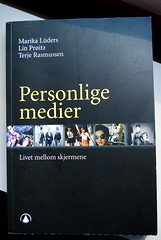Superstreng
I still find it utterly uncomfortable to talk on radio. But you know, I guess the practice is valuable. Or rather, I don't find it very uncomfortable to talk, but to listen to myself afterwards. A couple of weeks ago I visited Eirik Newth's "Superstreng"-show, and we were of course talking about social networking services, especially Facebook. Kind of common sense stuff. Here's the podcast. It's in Norwegian of course.
Facebook is highly profiled as vicious by the mass media these days. They apparently exploit all your personal information and intend to use your private photos in commercial campaigns. Or something. If you know Norwegian, you might want to read Ove Skåra's answers to readers of the Norwegian tabloid VG. Skåra represents the Norwegian Data Inspectorate.
I don't have the time to comment. Obviously, I have read Facebook's terms of service. My short answer is that mediated practices are experienced as so meaningful that they outweigh the perceived threats to privacy.
Labels: facebook, privacy, social network sites

